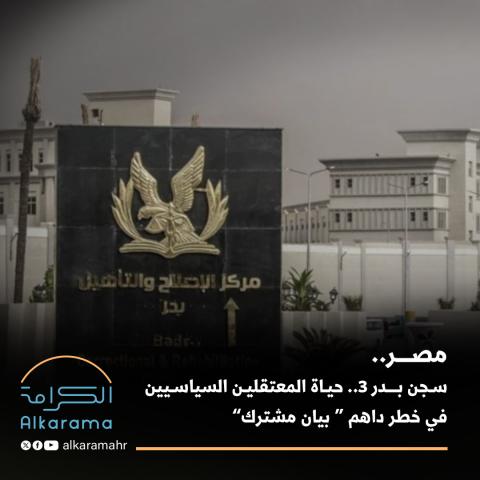
The undersigned human rights organizations strongly condemn the severe and systematic deterioration of detention conditions at Badr 3 prison, which poses an immediate threat to the lives of political prisoners in Egypt and constitutes a blatant violation of fundamental humanitarian standards as well as national and international laws.
During the Criminal Court hearings at Badr prison in July 2025, shocking and horrific facts came to our attention, revealing a true human tragedy and sounding an alarm. On July 12, several lawyers present reported that detainee Mohamed Anis Mohamed Al-Sharif attempted to cut the veins of both hands inside the defendants’ box. This desperate act reflects the extreme psychological pressure suffered by political prisoners. Even more disturbing was the evident inaction of the judges, who neither ensured immediate medical care nor opened an urgent investigation to determine the real reasons behind this desperate act.
At the hearing on July 5, detainee Khaled Al-Azhari, former Minister of Labor, cried out in anguish, with the words reported as follows: “We live in graves… we see neither sun nor light… at my age, to have to cut my veins… it is because I can no longer bear it.” By confirming his suicide attempt and showing an injury on his hand, he highlighted the profound despair prevailing within the prison.
Furthermore, Hassan Al-Barnes, academic and former Vice-Governor of Alexandria, and Ahmed Abu Baraka, lawyer and former parliamentarian, both reported hearing loss caused by prolonged isolation and total silence imposed in solitary confinement cells. These testimonies reveal severe physical and psychological harm caused by the systematic denial of medical care, as well as the prohibition of family and legal visits. Other detainees also confirmed repeated suicide attempts among prisoners, protesting the “deadly conditions” in which they are forced to live.
Flagrant Violations of National and International Laws
What is happening at Badr 3 prison is not a mere oversight but a systematic and deliberate violation of human rights, in blatant contradiction with the Egyptian Constitution and international human rights law. The refusal to allow visits and contacts with family members and lawyers — fundamental rights guaranteed notably by Article 10 of the International Covenant on Civil and Political Rights and Rule 58 of the Nelson Mandela Rules on the treatment of prisoners — constitutes a serious breach.
The United Nations Convention Against Torture has recognized that prolonged deprivation of contact with the outside world may amount to cruel, inhuman, or degrading treatment, or even torture. Likewise, Article 55 of the Egyptian Constitution explicitly prohibits torture and any form of inhuman or degrading treatment. Prolonged isolation, extreme overcrowding, lack of essential medical care, as well as denial of exposure to sunlight and adequate ventilation, are all forms of cruel, inhuman, and degrading treatment inflicted on detainees.
Urgent Requests to Egyptian Authorities and the International Community
The signatory organizations urgently call on the Egyptian authorities, including the Public Prosecutor’s Office, the judiciary, and the Ministry of Interior, to:
Open an immediate investigation and ensure accountability: Conduct a transparent and independent inquiry into all documented allegations of torture and suicide attempts at Badr 3 prison, and prosecute all responsible parties in accordance with the law.
Ensure comprehensive medical care: Provide urgent and nondiscriminatory medical and psychological treatment to all detainees, guaranteeing access to specialists and necessary medications.
End severe isolation: Immediately cease the policy of strict and prolonged isolation, and allow detainees to benefit from daily outdoor walks and human contact with fellow prisoners.
Guarantee the right to visits: Authorize family and legal visits unconditionally and remove all barriers to the exercise of this fundamental right.
Open detention facilities to oversight: Allow independent international and national commissions, including representatives of human rights organizations, unrestricted access to visit Badr 3 prison and all detention centers to assess conditions on site.
Release arbitrary detainees: Immediately review all pretrial detention cases and release those who have served their legal sentence or for whom there is insufficient evidence to justify continued detention.
The lives of detainees are in immediate danger. Desperate calls from inside the prisons demand urgent and resolute intervention. The signatory organizations call on the international community as a whole — including United Nations special mechanisms, governments, and human rights institutions — to exert maximum diplomatic and legal pressure on Egyptian authorities to end these severe violations of fundamental rights and ensure justice and dignity for all detainees in Egypt.
Signatory Organizations:
Justice Human Rights Foundation (JHR) – Istanbul
AFD International – Belgium
Association des Victimes de la Torture (AVTT) – Geneva, Switzerland
Human Rights Monitor (HRM) – London
Tawasul for Human Rights (THR) – The Hague, Netherlands
Human Rights Solidarity (HRS) – Geneva, Switzerland
Al-Shihab Center for Human Rights (SHR) – London
Sawt Hur for Human Rights – Paris
Egyptian Rights Council – Geneva
Cedar for Human Rights – Lebanon
Alkarama for Human Rights – Geneva, Switzerland
Addendum: It should be recalled that Alkarama has submitted several parallel reports during Egypt’s reviews before United Nations mechanisms, notably before the Committee Against Torture (October 2023) and the Human Rights Committee. These reports highlight human rights violations in Egypt, particularly the abusive use of restrictive laws under the pretext of combating terrorism, as well as the inhumane detention conditions of opponents, journalists, and human rights defenders.
Alkarama has also submitted follow-up reports to the Global Alliance of National Human Rights Institutions (GANHRI), particularly before the Sub-Committee on Accreditation (SCA), calling for the downgrade of the status of the Egyptian National Human Rights Council due to its lack of effective independence and its failure to address serious violations such as torture, enforced disappearances, arbitrary detention, as well as repression of freedom of expression and peaceful assembly.
